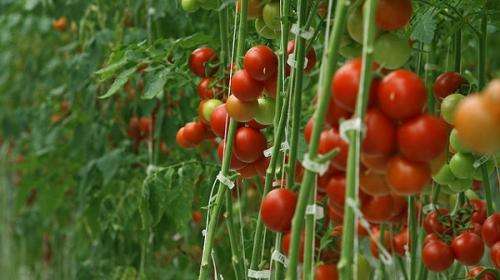Different watering regimes boost crop yields

Watering tomato plants less frequently could improve yields in saline conditions, according to a study of the impact of water and soil salinity on vegetable crops.
The Curtin University research found that fresh fruit production in tomatoes (Solanum esculentum) reduced by 19 per cent when the plant was grown in saline soil and by 88 per cent when it was irrigated with highly saline water.
But tomato plants still faired significantly better in saline conditions than the other vegetable crop tested in the study, including okra (Abelmoschus esculentus), in which fruit production was reduced by 59 per cent when grown in saline soil.
Curtin University research fellow and study author Ayalsew Zerihun says the two crops have very different ways of handling salinity.
He says tomatoes take up a lot of the salt and are able to tolerate high salt levels within the plant tissue.
Okra has the capacity to exclude the salt in the first place but when it does get into the plant it can be very harmful.
Dr Zerihun says that in both crops, yields were reduced more by water salinity than by soil salinity.
Okra potentially benefits from frequent watering
But saline soils had a much greater impact on the okra plants and the study suggests that, unlike tomatoes, okra benefit from frequent watering to leach the salt out of the soil.
"For okra, soil salinity is also very damaging," Dr Zerihun says.
"When you have issues like that maybe frequent leaching to leach out the salts from the root zone might be able to reduce uptake and also minimise the impact of soil salinity.
"Whereas for tomato, which seems to suffer comparatively more from (water salinity), maybe infrequent irrigation or larger irrigation intervals might provide one mechanism for minimising the impact," he says.
The research was led by Iraqi masters student Jamal Kamaluldeen and tomato and okra were chosen because they are common vegetable crops in the Middle East.
Dr Zerihun says the strategies suggested in the paper could be used by WA farmers but cautioned that the experiment was undertaken in a glasshouse rather than in the field.
"You have to know the conditions here before you can extrapolate the results," he says.
"If you are working in a middle of the range, moderately saline soil or (with) moderately saline irrigation water then the results we found here should be generally applicable."
The study is set to be published in December in the journal Agricultural Water Management.
Provided by Science Network WA















